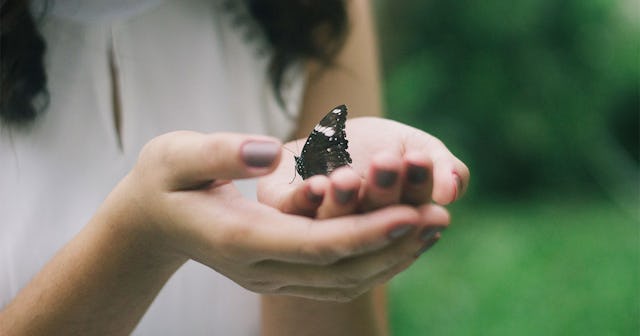What A Butterfly Release Taught Me About Grief After Losing My Son

I recently attended a grief retreat for bereaved mothers. On the last day, as a closing, we did a butterfly release.
I expected that when we opened our envelopes, the butterflies would all spring free to a chorus of ooohs and ahhhs, as we watched them soar and fly away, in a perfectly synchronized metaphor for hope and transformation even in our walk with grief.
That is not what happened. Not at all.
Some butterflies didn’t even move, while others fell to the grass when they tried to fly. It was a bit anticlimactic, and the opposite of the uplifting celebration of rebirth and new life we hoped for to mark the end to the retreat.
However, as I reflect on it, this experience of watching the butterflies haphazardly try to find their bearings in a new environment is a much better metaphor for living with grief.
I think about this in three key ways:
Losing someone you love is like waking up, disoriented, in a new and unfamiliar place.
While handing out the envelopes, one of our retreat leaders cautioned that the butterflies might take a little while to wake up.
This allowed me to consider my butterfly through a different lens.
I reflected on what the experience may have been like for him.
Aside: I don’t actually know if the butterfly was male, but after losing my son eight months ago, I tend to see everything in nature as a little boy.
I wondered what it was like for the butterfly to feel and smell the air of a new and unfamiliar place. To take in the new sights.
He probably felt disoriented and confused, displaced and lost.
One moment he was in a place he knew — whether a good or bad place, there is comfort in the knowledge of the familiar. Now, he was waking up to a new and uncertain reality.
And he did not get a choice in this new reality.
Grief is like that.
Preparing to emerge into a new life with grief is slow and deliberate.
After a reading, we were instructed to open the envelopes that contained the butterflies. When I opened the envelope, my butterfly just sat there.
Just sat there.
Slowly, he raised his wings to point then towards the sky, and with deliberate movements, he opened and closed them. He stretched his spindly legs, each one individually and intentionally. Next he uncoiled his long tongue to its full length, and retracted it slowly.
It was as if the butterfly was feeling every part of his body for the first time. And he took his time to get to know himself again. This was his awakening.
I think that in grief, even our very own bodies feel foreign. We may look the same, but we have taken on the invisible weight of adapting to a world we no longer know.
This process is slow and deliberate, and you should take all the time you need.
Give yourself grace when you fall, and someday you may fly again.
My butterfly attempted his first flight, and plummeted into the grass before he got too far. I hate to admit it, but I felt let down. I wanted this butterfly’s emergence to be a beacon of hope for my life, as I prepared to leave the retreat.
I wanted him to fly, not fall. I expected him to fly.
I think our grief-illiterate society has this same expectation after a major loss — that we quickly pick ourselves up, not stumble, emerge strengthened and in triumph over grief.
We even impose this expectations on ourselves, and beat ourselves up when we cannot be the same or are not “better.”
I walked over to the place where my butterfly had landed, and watched him try to reorient himself in the grass. I sat next to him, in solidarity, and let the uncertainty we had woken up to settle in. I know I will stumble and I will fall too, even as I just try to figure out how to walk side by side with my grief.
The butterfly wasn’t ready to fly yet, and neither am I.
In that moment, I decided to give myself and the little butterfly grace to just sit and be for as long as we needed.